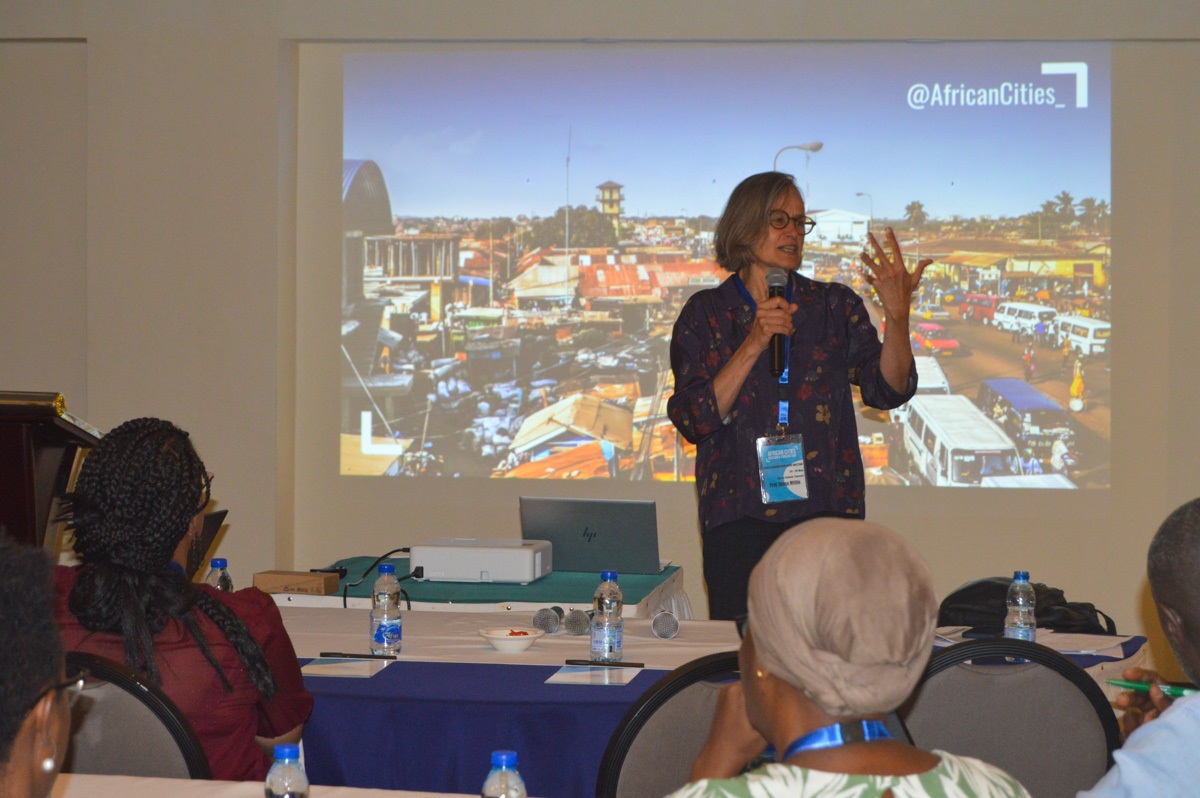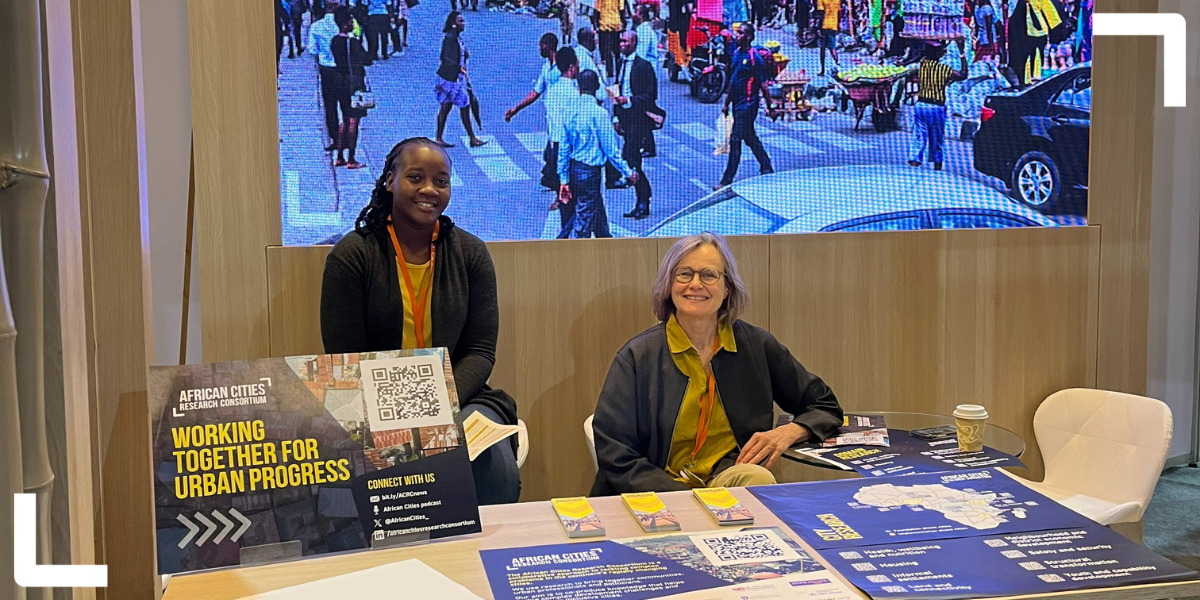The University of Manchester has recently advertised a new role – which involves taking over as CEO of the African Cities Research Consortium. In this blog post, our current CEO, Professor Diana Mitlin reflects on her own career, experiences and what comes next.
Like it or not, the truth is that I am very much at the end of my career. I am still puzzling out what a creative, fruitful and satisfying retirement will look like, but in the meantime, I’m trying to work out what it means to make a socially responsible transition into retirement. I’m using this blog post to help figure that out – but also to explain why we are currently looking for new CEO for ACRC.
Everyone tells me that you have to begin by creating space. That is an unusual activity for me. My professional life has been a whirlwind for 45 years.
Thinking back
My focus on urban development emerged accidentally from my interest in social justice and social movements. As I began work at the International Institute for Environment and Development (IIED) in 1990, the issue that really caught my interest and commitment was the potential to work with organised informal settlement residents. Initially, I was working with the organisations that became the founders of Slum Dwellers International (SDI), the Society for the Promotion of Area Resource Centers (SPARC) and the National Slum Dwellers Federation in India, People’s Dialogue and the South African Homeless People’s Federation.

I have learned much from my engagement with SDI. On one level, I have learned an immense about housing, infrastructure, services and land. On another, I have learned about the tools of grassroots organising, and about savings, data collection, mapping and federating. On a third level, I have learned about silence and speech, representation and presentation, alliance building and knowledge co-production.
The processes of collaboration between grassroots organisations, federations and their support NGOs have also been important opportunities. The role that the support professionals play – in raising funds, documenting lessons, building links with academics and officials, providing technical assistance (and in my case financial analysis), predicting the next generation of learning needs for federations, developing options so that they don’t get stuck but are able to move through obstacles and achieve the next level – is critical.
These have all been vital experiences to share. Also important has been seeing how governments open up possibilities for reform as political commitments change – and how those openings are not always well used. If academic and NGO innovations are not there to take a commitment into practice with specific workable ideas, if officials have not been well trained and are not aware of what greater participation might look like (for example), and if flexible funds are not available to support experimentation… Then these potentials can be lost.
These experiences have helped me understand the significance of the academy as a place to nurture new ideas and change agents.
Leading the African Cities Research Consortium
GDI’s strapline is a reasonable summary of what I have been motivated and inspired and supported by in my working life: Critical thinking and social justice.
Since 2020, I have had the pleasure of overseeing ACRC, which is now moving into its implementation phase. Some of the action research projects have been launched, others are being fine-tuned, some are still at the ideas stage and being tested out with key stakeholders. City teams are in place, familiar with each other and developing their collective identity and strategic intent. We are still working hard to bring the key learnings from the foundation phase into publication and also to a broader audience.

The chance to invest in change makers or urban reformers – be they located in the North or South, government or non-government, academic researcher or non-academic researcher – is hugely fulfilling. It is an honour and an inspiration to work with this team, and I have to struggle to keep up!
Engaging with the next generation is a constant pleasure. I work with a group of younger colleagues – some are early career researchers, others are in the middle of their careers – each thinking about the best steps as they go forward. All want to add value to their work and working with these individuals is one of the most rewarding things that I do. They are curious about what my generation have learned, and why these were our learning stories. But they are also putting together their own understanding of the world, drawing on the embeddedness in what is contemporary and thinking hard about what this means – in terms of obstacles that may be forthcoming, as well as ways in which cities may be made more just, more inclusive and work better for all urban residents. They are every bit as committed as we were, and fundamentally they offer reasons for hope that permeate the everyday in informal neighbourhoods, council offices and academic seminars.
What’s needed?
So, who would be well suited to pick up the ACRC baton?
Unusually, the University is offering this post as either a Professor of Urban Development, or as a Professor of Practice in Urban Development. This means that role can be undertaken by either a senior academic with extensive experience of working with policy actors and practitioners on urban development or someone with extensive operational experience in urban development policy and practice who has a strong research profile and grasp of current debates in the field; this includes candidates who have worked for non-governmental organisations, international aid agencies, and research-based civil society organisations. As you would expect, we have a job description here.
I feel that the role needs someone who embraces contradiction. ACRC is using development assistance, based in a Northern organisation, whilst also be seeking to challenge exclusionary development practice, including via the overly dominant roles of academics and professionals. ACRC is as much a paradox as the urban realities it seems to change. It needs someone who is ready to engage with those contradictions, seeing them as much as a solution as a problem – as the grain of sand in the oyster that turns into a pearl.
Someone who is very grounded in the work of movements to change things on the ground. Some see those as political movements, but ACRC is as concerned with nascent emerging movements that involve the everyday political, as with groups in open confrontation and contestation that so frequently results in a dead end.
Someone who is familiar with the academic spaces and with the practice of asserting that academic knowledge is at the top of the knowledge hierarchy. Someone who is comfortable playing with those ways of seeing the world, who can use academia to disrupt, to legitimate and to change the playing field on which discourse takes place.
But also someone who recognises the importance of ideas in defining trajectories of change. Who can write academic papers and capture that space. But who also sees the limitations of such knowledge.
Someone who has experience navigating the context of decolonisation. Who is deeply committed to creating space to challenge epistemologies, methodologies, academic practices of doing research, and the financial flows embedded in the development assistance system. And who has the ability to craft collectives that are able to navigate a route through tensions, conundrums and frustrations to deliver change.
How will it work?
The plan is that the new CEO and I will work an overlap for at least six months, and possibly a year, depending on when the newly appointed person is able to begin. The first six months will likely be a structured induction, which will be fine-tuned to the expertise of the person we appoint. If we have time beyond the six months, then we will co-design a plan for the work that reflects the needs of the project and the capabilities of the new appointee and myself.
From August 2026, I plan to be on sabbatical for a year. I will be focused on writing up the experiences of ACRC over this period, although I am not sure exactly what form that writing will take at the moment. In terms ACRC leadership beyond this, I will be available as needed, but will not be building in any role for myself. I feel the new CEO has to take control, so to speak, and any ongoing function I might play is very much for them to determine.
I’m sure that people will have many questions, queries and reflections about the plan we are putting in place. Over the next few weeks, the ACRC team will be gathering questions for an ‘Ask Me Anything’ podcast that I’ll be recording. Please ask me anything you like though ACRC’s social media, or via africancities@manchester.ac.uk.
Photo credits: ACRC
Note: This article presents the views of the authors featured and does not necessarily represent the views of the African Cities Research Consortium as a whole.
The African Cities blog is licensed under Creative Commons Attribution-NonCommercial-NoDerivatives 4.0 International (CC BY-NC-ND 4.0), which means you are welcome to repost this content as long as you provide full credit and a link to this original post.


